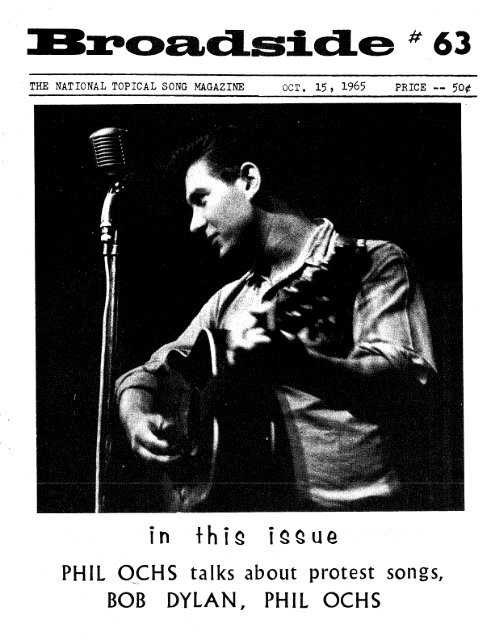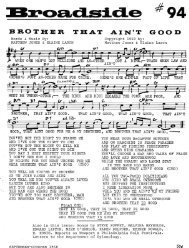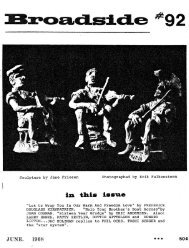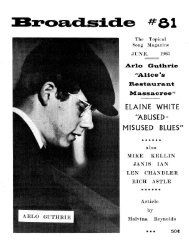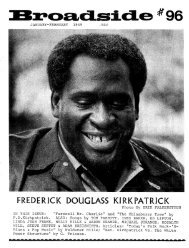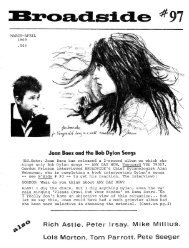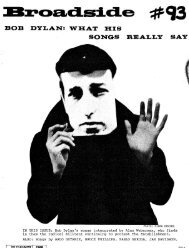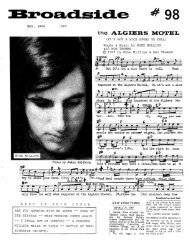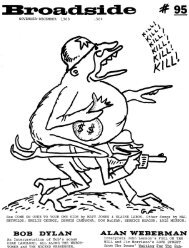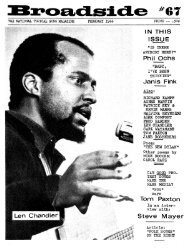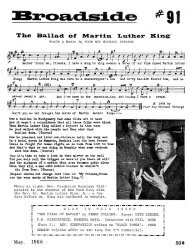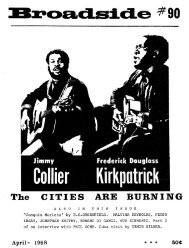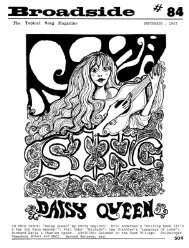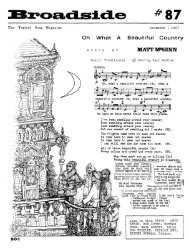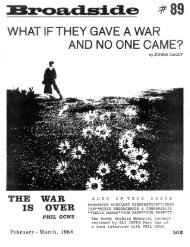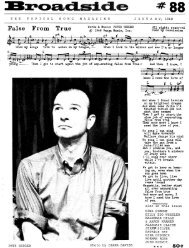Create successful ePaper yourself
Turn your PDF publications into a flip-book with our unique Google optimized e-Paper software.
a,dside # 63<br />
THE NATIONAL TOPICAL SONG MAGAZINE OCT. 15, 1965 PRICE -- 50¢<br />
in thi~ i~~ue<br />
PHILQ~HS talks about protest songs,<br />
BOB DYLAN, PHIL OCHS
Words & Music by PHIL oeBS<br />
Sit by my side; come as close as the air,- Share in a memory of<br />
£'11\<br />
riP' p<br />
p..'In 1) ::::l . Gt-l --I- L<br />
(Fir Jlf pr ;iIJ J t<br />
!.~, And wander 1n~y words, and dream a-bout the Pictures that<br />
i Am :J> J G-~ J.I Go.<br />
I<br />
Js J1J.<br />
.. (I<br />
play of chang-. es,<br />
;.<br />
I<br />
.1<br />
2. GREEN LEAVES OF SUMMER TURN RED IN THE FALL~<br />
TO BROWN AND TO YELLOW THEY FADE<br />
AND THEN THEY HAVE TO DIE, TRAPPED WITHIN THE<br />
CIRCLE THm PARADE OF CHANGES.<br />
3. SCENES OF MY YOUNG YEARS WERE WARM IN MY MIND.<br />
VISIONS OF SHADOWS TI~T SHINE.<br />
TILL ONE DAY I RETURNED, AND FOUND THEY WERE THE<br />
. VICTIMS OF TliE VINES OF CHANGES.<br />
4. THE WORLD'S SPINNING MADLY, IT DRIFTS IN THE DARK,<br />
SWINGS THROUGH A HOLLOW OF HAZE.<br />
A RACE AROUND THE STARS, A JOURNEY THROUGH THE<br />
UNIVERSE ABLAZE WITH CHANGES.<br />
\<br />
5. MQMENTS OF MAGIC WILL GLOW IN THE NIGHT,<br />
ALL FEARS OF THE FOREST ARE GONE.<br />
BUT WHEN THE MORNING BREAKS, THEY'RE SWEPT AWAY BY<br />
GOLDEN DROPS OF DAWN, OF CHANGES.<br />
6. PASSIONS WILL PART TO A STRANGE MELODY,<br />
AS FIRES WILL SO~IETIMES BURN COLD.<br />
LIKE PETALS IN THE WIND, WE1RE PUPPETS TO THE<br />
SILVER STRINGS OF SOULS, OF CHANGES.<br />
7. YOUR TEARS WILL BE TREMBLING, NOW \oJE'RE SOME\oJHERE<br />
ONE LAST CUP OF WINE WE WILL POUR.<br />
I'LL KISS YOU ONE MORE TIME, AND LEAVE YOU ON THE<br />
ROLLING RIVER SHORE OF CHANGES.<br />
8. (REPEAT FIRST VERSE).<br />
~"C'('AO£<br />
,'f".", / .,f4K.,<br />
,;~ . 7-! Atlc.4Jui" SUI rt tOOA.<br />
JJ£w '10(1."1 4J£VtI Y""" '''Ot~<br />
lIRo,4DS IlJE<br />
it63
PHIL OCHS - 2<br />
PHIL: Well, 11m quite sure the words are getting<br />
through with Dylan, Dylan was lmown for that before<br />
hand. Dylan was known as the writer- the poet -<br />
first. And in ROLLmG STorIE the idea comes across<br />
pretty clearly. It's one of Dylan's clearest recent<br />
songs. And on his brand new album HIGHHAY 61, that<br />
song is the most down-to-earth. And lim quite sure<br />
people listen to the lyrics. And Dylan is maturing<br />
musically. This is one thing people overlook. His<br />
musical ideas are getting more sophisticated. For instance,<br />
in LIKE A ROLLING STONE, he has a great musical<br />
pause which leads in to the chorus "How does it<br />
feel. ..." that I s incredible - it's great. It I S one<br />
of the few cases where he actually put in a musical<br />
idea so striking and original that it equaled his<br />
words, or more than that -- it enhanced his words<br />
and gave them a double impact. I'm convinced that<br />
LIKE A ROLLING STONE is one of Dylan I s best songs of<br />
all his work, even going back through all his early<br />
stuff. If I had to pick Dylan's five best songs,<br />
that would be one of them, along with TAMBOURmE MAN<br />
and IT'S ALL RIGHT MA, IT'S ONLY LIFE. I think it's<br />
great -- and most important.<br />
SIS; Hell, how do ~ feel about the use of Rock &<br />
Roll music? Would ~ use it in the way Dylan does,<br />
to reach a wider audience?<br />
PHIL: Well, I don't lmow. I have mixed feelings<br />
about it. A few years ago I was thinking about it-<br />
before it happened -- when I was writing articles<br />
about Rock and Roll and Protest. I was thinking then<br />
that I ought to do it. But •••<br />
SiIS: You I d certainly agree that Like a Rolling Stone<br />
or Eve ot Destruction wouldn't have reached but a<br />
fraction of the audience had they used the acoustic<br />
guitar -- like you do. Right?<br />
PHIL: Right. That's true. And that's my dilemma.<br />
It~s a choice I've got to make. I really don't lmow<br />
what to do. I've got a new song called CHM1GES and<br />
I've got to do something with it. I'm going to put it<br />
on a single, and I don't think I'll use electronic instruments<br />
on it -- there's just a kind of conotation<br />
about electric instruments that disturbs you now, but<br />
didn't a few years ago. But there's so much imitation<br />
going on. There's so many Jo~-come-latelies that<br />
turn me off, on the pop field. It would be really<br />
very disturbing to me to join that flock, so I tend<br />
to think that I won it do it. I want 'ELEKTRA to put<br />
out a single more along the line of the Beatle's<br />
YESTERDAY which I think is more tasteful than the<br />
usual thing.<br />
SIS: We've been getting various responses to Dylan's<br />
new LP Highway 61 Revisited. Some say, I guess for<br />
lack of a more imaginative term, that it's drivel -<br />
he I s just putting the people on again. These presumably<br />
are the people who left Dylan at the time liThe<br />
Other Side of Bob Dylan" came out. And then we also<br />
have people who say "hey, have you heard Dylan's new<br />
LP -- it's a great piece of poetry, it's an outpouring<br />
of poetry which hasn't been equaled since Walt<br />
Hhitman or Woody Guthrie - to listen to it is an<br />
all-engrossing, almost monolithic experience." What<br />
is your reaction?<br />
PHIL: Well, I fall into the latter category. I feel<br />
that it's great poetry. But I think Dylan's reached<br />
his peak. When he made the record before this one -<br />
Bringing It All Back Home with TAMBOORINE HAN and<br />
IT'S ALL RIGHT, MA ••• , I thought this was just too<br />
much -- how can a human mind go beyond this. But he<br />
had. In several songs, MR. Jorms and DESOLATION Rrn<br />
and LIKE A ROLLING STONE, Dylan has brought this<br />
whole thing up to a brand new level. You can see a<br />
pattern emerging now, a real pattern, He just keeps<br />
raising the whole thing - his stream of consciousness<br />
just gets higher and higher, and you can see a<br />
mastery -- a control of words -- developing that he<br />
didn It have before. Even in his best songs he would<br />
be eratic - -go up and down. But now he seems to<br />
have matured in his control of music. He starts in<br />
a certain thing and he keeps up and he reaches climaxes.<br />
And his writing becomes - I guess you could<br />
almost describe it as symphonic. He takes themes and<br />
builds on them. People worry, "Is he putting me on,<br />
is he talking about me?" and so on. It doesn't matter<br />
actually. Dyla."l is putting everybody on. It<br />
wouldn't bother me--it wouldn't surprise me either-<br />
it Dylan is -putting himself on, and lmows it - or<br />
doesn't lmow it. That Wouldn't surprise me. None<br />
of these things I feel are that important. I feel<br />
what I s important is that he I s produced the best album<br />
ever made - the most important and revolutionary<br />
album -- because he's reached such heights of<br />
writing. He's right in his style, he's right in his<br />
poetry, he's right in his presentation of his senses<br />
of life, in his perception and his feelings. And<br />
listening to Dylan lately is almost like climbing a<br />
ladder; you look at it as you would look at a painting.<br />
You don't look at a painting and say "That's<br />
great" and right away walk away from it. And you<br />
don't listen to Dylan once and say "That's good."<br />
It's the kind of music that plants a seed in your<br />
mind and then you have to hear it several times--ten<br />
times. And as you go over it you start to hear more<br />
and more things, and you start to see Dylan's maturing<br />
use of words and images as paralleling. And his<br />
control. Dylan is growing up as a writ-er. Without<br />
sacrificing his searching into his own mind and his<br />
pioneering, he's set a fantastic style. He's done<br />
it. He's done something that's left the whole field<br />
ridiculously in back of him. He's in his own world<br />
now. He was getting into his own world in his last<br />
record, but now what's happening is that he's in<br />
control of his own world. Before his world was<br />
controlling him. Control and discipline are the<br />
key words. Dylan is developing a discipline he never<br />
had before. There were flashes of genius before,<br />
but now his flashes of genius are under his conscious<br />
control. And the conbination is devastating.<br />
But whaGt's going to lead to next, God only lmows<br />
---or you might say, Dylan onl.v lmows.<br />
GORDON: Well, would you consider Dylan a great<br />
poet apart from his music?<br />
PHIL: Oh, definitely. He's one of the great minds<br />
of all time when it comes to words. He's a natural<br />
with woreis. He knows how to create i."'~es without.<br />
straining. It just comes naturally. And when he does<br />
strain - when he does work - it comes to him better.<br />
He's never written a bad song. His weaker songs are<br />
just more eratic. But even when he uses trite things<br />
-- when he uses cliches and steals whole ideas,<br />
there I s still enough of him in there and enough of<br />
his obvious penetration working.<br />
GORDON:Well, do you'think his music is an integral<br />
part of his poetry? I'd like to put it this way:<br />
America, for many years now, probably since longfellow.<br />
hasn It shown any great respect for its poets,<br />
especially the poets of modern times - except when<br />
Jack Kennedy got Robert Frost out for the inaugeration<br />
- and these poets have received very little mass recognition.<br />
They've had to be satisfied with editions<br />
of 500 or 600 copies of their books of poems, and have<br />
(Continued -+)
PHIL OCHS - 3<br />
had to live not by their poetry but by grants or patrons,<br />
or by teaching English in some college. Do<br />
you think that Dylan by putting his poems to music<br />
has broken through this barrier of indifference? He<br />
has by now actually reached millions of people. Do<br />
you think he's using the music just as a device to<br />
get his poetry over to all these people, ~astly<br />
greater numbers than any American poet has ever<br />
reached, or do you think his music is an integral<br />
part of what he is creating?<br />
PHIL: It I S a combination of both. I tend to think<br />
his music is an integral part - it i S poetry in song<br />
form. And therefore not really subject to all the<br />
disciplines of classic poetry, but subject to the disciplines<br />
of the ballad and of music. And he's combined<br />
the two. ·And as to Frost, Kennedy could bring<br />
Frost out, but that doesn It mean anything really. I<br />
mean, it's a nice gesture, but Robert Frost didn't<br />
speak to the mass; Robert Frost as all of the other<br />
poets of the past spoke to the intelligentsia, spoke<br />
to a small minority of the country. And a truckdriver<br />
couldn't care less whether Robert Frost was<br />
there with Kennedy or not --<br />
GORDON: Whitman wanted very much to speak to the<br />
masses, but he really reached only a handful of the<br />
intellectuals ---<br />
PHIL& Some poets want to, yes, want to reach everybody.<br />
But you see, Dylan has in fact done this.<br />
This is one of the incredible things about Dylan.<br />
He's the first poet to speak to everybody --to the<br />
mass audience. And it has been through the vehicle<br />
of music. And also that his poetry is - even when<br />
he gets way out - is basically down to earth. His<br />
poetry can be followed. His images can be understood.<br />
He haan' t broken into complete mystical<br />
allusion where there's no way of following him,<br />
logically, without intense study. He hasn't broken<br />
into Complete literary allusion where you can only<br />
listen to him by being incredibly well-read yourself.<br />
as you have to be to read T. S. Eliot. So<br />
Dylan is still reachable. Even in his new record<br />
where he goes way Qut in his poetry it's all quite<br />
clear - you can follow it. You can sit there and<br />
listen to it and if' you want to spend the time for<br />
two or three hearings you can follow him quite clearly,<br />
even though there may be many different interpretations<br />
of what he is saying. The level of his<br />
writing stays on the level of the common mentality,<br />
which makes Dylan the great sommon poet -- perhapa<br />
the greatest common poet ever.<br />
But there's something about this that I've got to<br />
bring out. There's something very dangerous, something<br />
very frightening about this whole thing now.<br />
Dylan is very disturbing. Dylan gets up there and<br />
sings great thoughts and grent poetry to everybody;<br />
and when you say everybody you mean also to neurotica,<br />
to immature people, to the lumpen proletariat,<br />
to people not in control of themselves. Dylan is<br />
forCing everybody to listen to him, the quality of<br />
his work is so good and 50 communicative. He's<br />
forcing everybody to listen to him, and I wonder<br />
what '!I going to happen. I don't know if Dylan can<br />
get on the stage a year from now. I don't think so.<br />
I mean that the, phenomena of Dylan will be so much<br />
that it will be dangerous. One year from now 1<br />
think it will be very dangerous to Dylan's life to<br />
get on the stage. In other words, he's gotten inside<br />
so many people's heads -- Dylan has become<br />
part of so many people's psyche. and there' re so<br />
many screwed up people in America, and death is<br />
such a part of the American scene now. The<br />
Kennedy assassination is a part of this story.<br />
People are much more conscious of death because<br />
when Kennedy was killed youth was killed, beauty<br />
was killed, security was killed. You see, America<br />
has been living a kind of floating existence. This<br />
is what alienation means essentially -they had been<br />
divorced from life. They left the farm, they're in<br />
the .cities and they've been separated from life.<br />
Everything is solved -"Don't worry about this; you<br />
can get an operation for that" - everything is going<br />
to be taken care of. But one thing that can't<br />
be taken care of, even in America, is death. And<br />
Kennedy's assassination brought this realization<br />
home to everybody. And Kennedy, for the first time<br />
in history brought this thought home to the young.<br />
Dylan has become of such mammoth proportions, this<br />
great quality reaching so many minds and Dylan is<br />
part of so many peoples I psyches and is inside so<br />
many heads that I can even foresee his having to<br />
leave the country - go to France, go to Cuba, and<br />
sit there and write. Or, you know, the next step for<br />
Dylan should be movies. By his appearance, by the<br />
way he moves -- this makes for a most valid screen<br />
figure. Every time I see Dylan I'm struck by how incredibly<br />
photogenic and how alive he is, and what I'm<br />
waiting to see is not that he ~top writing songs but<br />
how he can expand his writing. I'm not so much excited<br />
by the idea of Dylan's book because I tend to<br />
feel that Dylan I s book will limit his form, that it'll<br />
be too much of a good thing, that Dylan is most effective<br />
when he's taken in small doses, that to<br />
plough through several hundred pages of free-wheeling<br />
verse will be too much. I I m sure it'll be the same<br />
great images and the same great ideas, but I don't<br />
feel he's carried discipline to the point where he<br />
can carry a book. But I think he can carry a movie.<br />
With the ideas inherent in Dylan, as obviously visual<br />
as he thinkil and with the right director - and with<br />
Dylan working on the .script as he goes along -- it<br />
could once again be a floating, a free-wheeling type<br />
of thing. It could be that type of movie which hopefully<br />
would not make the mistake of being an imitation<br />
of the Beatles' movies. It should be much more than<br />
that. I think that's the next step.<br />
What is happening to Dylan now could have been foreseen.<br />
Even without the going into Rock & Roll -<br />
all this storming onto the stage -- he's playing<br />
with teenage minds by being in the pop market, and<br />
it's a dangerous thing. And I think he's going to<br />
have to quit. Dylan, I think, will become the most<br />
successful entertainer of all times, and by being<br />
so successful and 90 right, will have to quit.<br />
That's the paradox. On this immediate level, it<br />
won't make sense for Dylan to get on the stage a<br />
gain. I mean Dylan would feel so IDlcomfortable,<br />
and there'll be too much of a strain in that concert,<br />
or even in the outdoor concert hall, that<br />
he'll just have to leave. ~,d that's really an incredible<br />
thought. But I can see it happening -<br />
already.<br />
SIS: But at his Forest Hills concert, and at Ne1'i]Jort,<br />
the audience was divided.<br />
PHIL: But that was a Rock-and-Roll thing there. But<br />
that is part of what I'm talking about too. The<br />
Beatles can get away with it in all the screaming<br />
and attack because they are essentially selling<br />
youth and being flip and yaung and just going out<br />
there and having a good time when they sing-- you<br />
know, have a ball, have a great time. But Dylan is<br />
doing much more psychological things than that. He I s<br />
doing it in much more psychological terms and going<br />
much deeper in his words. And I can just picture<br />
young teenagers all over the country sitting up in<br />
(Continued -+ )
PHIL OCHS -- 4<br />
their bedrooms listening to Dylan again and again<br />
and again trying to find out what he is saying. And<br />
Dylan, or course, has this whole aggressive thing -<br />
this whole attaking, putting down. This is part of<br />
his style like in his new single, "I wish you were<br />
standing in my shoes so you could see what a drag it<br />
is to see you •••"<br />
And also in LIKE A ROLLmG STONE,<br />
the same way there: once you hung around with the incrowd,<br />
and now you're on your own-- how does it feel?<br />
-- and screw you, you're out and it's too bad -- no<br />
sympathy, but a hatred, a real aggression corning out.<br />
And all this dane on the stage, and done great. It's<br />
not done in any sophomoric way at all. And it has a<br />
very disturbing effect on people. It's.really an<br />
incredible thing.<br />
GORDON: It drives a man to drlnk -- or to LSD.<br />
PHIL: Dylan is LSD on the stage. Dylan is LSD set<br />
to rmlsic - that's D-Jlan.<br />
SIS: You I d say than that these masses of teenagers<br />
listen to Dylan with no other thought or feeling than<br />
one of complete absorption. Do you think this is a<br />
form of hypnosis -- would you say that it is?<br />
PHIL: It I S a form of hypnosis • It's not that everybody<br />
sits there listening to him with a single-track<br />
mind; Dylan has managed to convene a very dangerous<br />
neurotic audience together in one place, who are<br />
all hipped on him on different levels. They aren't<br />
all listening to him in the same way. 700 t' s the<br />
danger of it -- they're all listening for different<br />
things. Some of them are there looking for the lost<br />
symbol of the message singer. And none of them have<br />
any right to him. You see that I s the thing that<br />
none of them really understand: none of them have<br />
any right to Dylan. Dylan is an individual singing.<br />
And these people want to own him. And that's what<br />
a lot of Dylan's songs are about: You can't own me--<br />
1 1 m. free; you can't own me even though you want to,<br />
and you can go to hell - for even trying to own me.<br />
And that's absurd-- that's a joke - sitting there<br />
and saying we want the old Dylan, or we want the new<br />
Dylan. That's bull shit , that's nonsense. It's evil.<br />
It's a very sick thing going on there. And it's because<br />
of this neurotic audience that Dylan has got.<br />
And that is why Dylan has got to be careful, and that<br />
is why he'll have to quit singing.<br />
But there's another major step that hasn't been<br />
brought into focus yet: Dylan in translation - Dylan<br />
in Russian, in Chinese, in African languages. This<br />
is a major step, a major hurdle that he's going to<br />
make now, or that's going to be made for him. And<br />
the implications of that are going to be very, very<br />
far reaching.<br />
GORDON: - or even Dylan really translated into<br />
American. He had a !!!Uch more understanding audience<br />
in England, more appreciative, more -<br />
PHIL: More mature. Because America is a country in<br />
turmoil, a country without any backbone -- a country<br />
that doesn't understand itself -- and that's also<br />
why I say Dylan has to leave, because he's playing<br />
with a country that doesn't understand itself. And<br />
he's putting it down for that; he's putting down a<br />
mass of people that don't understand themselves, that<br />
are totally screwed up. And when he goes to England<br />
he gets a more intelligent audience, a more cammon<br />
audience. I got the same thing in Canada -- I went<br />
to Canada and was struck with the difference. And<br />
that was just over the border in a country considered<br />
similar to the U.S., but there was an incredible difference.<br />
I walk on the street in America and I sometimes<br />
think somebody is going to shoot me in the back,<br />
I see the look in other peoples I faces and I feel this<br />
terrible tension. In Canada I never felt that.<br />
SIS: You draw a different audience than Dylan, don't<br />
you? Here in this country, aren't your audiences<br />
dissimilar?<br />
PHIL: We overlap to a surprising degree.<br />
SIS: It' B that part of the audience which calls for<br />
the "old" Dylan and boos the "new" Dylan which, I<br />
feel, follows you -- the audience that wants the<br />
straightforward, uncomplicated protest song, the audience<br />
that likes "With God On Your Side".<br />
PHIL: I'm quite sure Dylan despises what I write.<br />
I've talked to him about this at some length~d<br />
I get the impression he can't accept what I'm doing.<br />
Because in his mind it's political and therefore<br />
bullshit. Because I'm not writing about myself and<br />
my deepest emotions, he feels. And I'm not facing<br />
the thing as brutally honestly as he is -- in other<br />
words, he thinks that I could be much more honest<br />
with myself. And this is the disturbing thing.<br />
Here's the man I most respect in the world, Dylan,<br />
telling lIle that -- "hey, your writing is bullshit",<br />
essentially. And I keep on writing it, after him<br />
telling IIl6 this. And I have to search myself all<br />
tne time, ask myselt what am I dOing, am I kidding<br />
myself, is Dylan kidding himself about politics, and<br />
the more I think about it the more I'm convinced we're<br />
both valid. I think Dylan's telling me I 'm writing<br />
the wrong thing has been a help to me in a sellse, because<br />
it's made me look at myself in the deepest way<br />
-- beoause, here's one of my main souroes attacking<br />
me and I have to look at Iqself and question what my<br />
reasons are for writing these songs. Am I a complete<br />
phony as he thinks -- is that true? And I keep caning<br />
up with the answer that I think I am doing the right<br />
thing. I think that Dylan makes a basic mistake here<br />
in rejecting his old writing and my writing -- this<br />
relates to what I have said many times before, namelJr<br />
that there are a lot of bad protest songs being written,<br />
and they've been very blunt and unartistic and<br />
very unreaching and wisearching songs. I wrote an<br />
article about the BROADSIDE Hoots saying that exact<br />
same thing. But I'm trying to be a writer, and 11m<br />
trying to be as good a writer as I can. And I'm<br />
taken with the art form of Booial realiSill. There<br />
is a basic question here: can you rejeot any form<br />
of art? I don't think so, and I also think that<br />
social realism is a valid form of art. Take, for<br />
example, social realism in movies. I think a lot<br />
nowadays in terms of movies and I go to see them all<br />
the time. I'm struck with the art form of movies,<br />
and I've seen a number that bear out my idea that<br />
great art can be achieved in the use of social realism.<br />
There's the Italian movie of the forties,<br />
OPEN CITY -- an anti-fascist movie -- a great movie<br />
- and it's a social realiSill movie. In America THE<br />
DEFIANT ONES compares to it, and that is also a<br />
gTeat movie of social realism. 'rnere is no reason<br />
why this can't also be done in song. HERE'S<br />
TO THE STATE OF MISSISSIPPI becOOl.es - in performance<br />
- a very moving, an overpowering, a<br />
punching out fom of social realism.<br />
And what I tz:y to say to Dylan -- to a lot ot<br />
people - is: why can I t you grow as a poet within<br />
the framework of social realism? \'/by can't<br />
you develop your cratt., your discipline, in this<br />
area, too? The use of one art form does not exclude<br />
another. For example, I've written a new<br />
song called CHANGES which is very important to me<br />
because it is a very personal and poetic song. But.<br />
by writing that song I did not prove to myself that<br />
what I was doing before was nonsense - it is juat<br />
another form, and frankly, a more sat.istying form<br />
(Continued -+)
PHIL OCHS -- 5<br />
personally -- I can sing CHANGES to myself more<br />
than I can the political songs and get· more intense<br />
feeling out of it. So when I write CHANGES and<br />
find it satisfying I Bay to myself: what have I<br />
done that works so well in this song that I can<br />
apply also to the songs of social realism? Going<br />
back to Dylan, I really hope he doesn't become<br />
too violent in putting down hi~ former self, because<br />
in the end, I think, that will limit him as<br />
a writer. He will limit his scope. I still maintain<br />
he could have gone much further than he did<br />
in the idiOlll of social realism. And even now he<br />
can go back and do it. I think that's what he did,<br />
essentially, when he wrote IT'S ALL RIGHT MA. In<br />
it he combined the old Dylan and the new and it IS<br />
one of his very best songs because it brought together<br />
the best elements of the two. But Dylan<br />
feels that protest denies the esthetic. This is,<br />
of course, an historical argument. a classical<br />
view of art: that protest denies art by the mere<br />
fact that you're protesting. However, I think that<br />
there can be esthetic proteste The esthetic plus<br />
social realism plus music plus a sense of art plus<br />
discipline plus understanding where you are at<br />
and trying persistently to improve your work.<br />
I ask myself, why does an artist feel impelled to<br />
write about society - about what is going on.<br />
And I look at the American society and I get the<br />
view that America has become quite fat and quite<br />
alienated from life and from a sense of struggle and<br />
fram a sense of conflicte lid like to illustrate<br />
this also by my journeys to the movies. Two days ago<br />
I saw a movie called TO DIE IN MADRID, a documentary<br />
on the Spanish Civil War. And it's very strange --<br />
here I am a comfortable middle class Jewish gpy sitting<br />
there watching movies from 1936 and 1937 and<br />
seeing young men volunteering tor the International<br />
Brigade and going to fight in Spain and you see the<br />
pattern emerging fram the movie that they're just not<br />
going to win. They're going to be fed into the German<br />
military machine as fodder to test out new weapons<br />
and they're going to die, thousands and thousands are<br />
going to die and they're going to be tortured. And I<br />
sit there wondering, questioning myself all the time:<br />
could I do that? And I've got this great streak of<br />
cowardice in myself and 11m most afraid of dying -<br />
and I sit there wondering, could I? Then I walk outside<br />
and I go down to the Village and I see people<br />
running around with long hair, climbing on the Beatle-Dylan<br />
bandwagon and I!m struck with this incredible<br />
difference of the young man going ort to die in Spain<br />
and the young man growing his hair long and trying<br />
to sound like John Lennon. It becOliles iii revolting<br />
thing. You sse it adds up to this: when you try to<br />
develop your sense of perception you came to the<br />
inevitable view~ the world is absurd. Which is essentially<br />
what Dylan says. How can you even think<br />
about itl It just can't be possible. No amount of<br />
work can ever change the absurdity.<br />
This leads to - and somehow this is the thing --<br />
this is what I can't understand as part of my own<br />
psychological make-up. Something inside of me gets<br />
greatly disturbed at seeing this absurdityj and this<br />
as it turns out is probably the root of my songs. And<br />
yet lim totally turned off -- as I have written in recent<br />
articles -- by the·protest songwriting movement,<br />
because it tends to have too much disregard for quality.<br />
There is a further paradox here, and I'm trying<br />
to resolve it by thinking and talking about it. Something.in<br />
my psyche has to feel the responsibility of<br />
what goes on in Viet Nam. When we bomb North Viet Nam<br />
I have to be disgusted and repelled. But I can also<br />
look at Viet Nam and laugh, can make jokes like itls<br />
a fun war. And laugh about the napalm. I admit this -<br />
I do laugh about it, and s~, well, it must be a joke,<br />
it's so ridiculous. I can make jokes about it in<br />
what you might call sick humor. But then I go oft and<br />
I write a very serious song about it. In the notss<br />
of my last record there was one very important part<br />
that ELEKTRA cut out - in which I said that some<br />
of these songs are so intense that when I'm singing<br />
them on the stage sametimes my view of the absurd<br />
will carry me one step beyond how evil samething is.<br />
And I fear that one day I might have to break out<br />
laughing on stage. ELEKTRA was afraid to print that<br />
because they thought it would hurt my image. They<br />
were worried about my image. But I sure wish they'd<br />
printed it -- well, at least we'll get it out here<br />
in BROADSIDE. You see, it's a paradox inside my<br />
head, to laugh at something and at the same time take<br />
it seriously and deal with it.<br />
Another thing - I can look at Viet Nam and I can<br />
write songs against it and raise money. It disturbs me<br />
incredibly. Yet what disturbs me also is to pick up<br />
!h! ~ and read about the genocide in Viet Nam because<br />
I can't look at it that way either. I can't say<br />
that is genocide. I can't look at Lyndon Johnson at<br />
times as the caricature that is made of him by the<br />
leftwing press, because I recognize that he is a human<br />
being with the same sense of humor, I'm sure, that I<br />
have. I feel held laugh at same of these things, too.<br />
Or that many times our views would cross. And so this<br />
is the contradiction inside of myself.<br />
To sum up. This is one thing I feel is a driving<br />
force: that I get so repelled by certain things -<br />
or they strike me as funny - or weird cr strange<br />
or ridiculous -- and rr.ry response cames out in the<br />
form of a song. And there is one thing that helps<br />
carry me through: this close identifioation with<br />
the problems of the world where things like Viet Nam<br />
go on. And as I said before, it's not enough to<br />
know the world is absurd and restrict yourself merely<br />
to pointing out that fact. To me this was the essential<br />
flaw of the fifties, great perception leading<br />
to inaction. It there is to be any hope for the<br />
world this peroeption must lead to action. In the<br />
song MY BACK PAGES Dylan laughs at himself as an impotent<br />
musketeer fighting false battles. I often<br />
laugh at myself in the same way and many times consider<br />
my role ridiculous, but still I am forced to<br />
go on. Because the ugly fact is ingrained in my mind<br />
that if I donlt go on the world will be lett to the<br />
hands ot the Hitlers» the McCarthys and Johnsons. I<br />
don I t want to have to read Dylan I s works smuggled out<br />
fram prisons. I like to bring in the great Greek<br />
writer Katzenakis to illuetrate this point. He s~s<br />
it ie wrong to expeot a reward for your struggle. The<br />
reward is the act of struggle itself, not what you<br />
win. In other·words, even though you can't expect to<br />
defeat the absurdity of the world you must make the<br />
attempt. That's morality, that's religion. That's<br />
art. That's life.
R<br />
Words & Music: PHIL OCHS<br />
© Copyright 1965 by<br />
Barricade Music~ Inc.<br />
O'!. ver the ashe; of blood marchC!d the sol-diers, -<br />
f m ' *'IT\<br />
. r _* ~or_tress of a !ailure,- O-ver the silent screams<br />
\ ~ _E. .. A. ~ 1'1\ - ~ ~ =I<br />
nit! ,<br />
'*1' fe1r r pi f PillQQ£~ J IE<br />
Saylllg please be re- a<br />
ssured, --- We seek no ~ der ,.,ar. ------<br />
II<br />
2. The treaties were signed, the country was split into sections<br />
But growing numbers of prisons were built for protection<br />
Rapidly filling with people who called for elections<br />
BUt please be reassured, we seek no wider war.<br />
3. Ngo Dinh Diem was the puppet who danced for the power<br />
The hero of hate who gambled on hell for his hour<br />
Father of his country was stamped on the medals we showered<br />
But please be reassured, we seek no wider war.<br />
4. Machine gun bullets became the bloody baptizers<br />
And the falcon copters don't care if someone's the wiser<br />
But the boy in the swamp didn't know he \iaS killed by advisers<br />
So please be reassured, we seek no wider war.<br />
5. And fires were spitting at forests in defoliation<br />
While the people were pressed into camps not called concentration<br />
And the greater the victory the greater the shame of the nation<br />
But please be reassured, we seek no wider war.<br />
6. While we were watching the prisoners were tested by torture<br />
And vicious and violent gasses maintained the order<br />
As the finest Washington minds found slogans for slaughter<br />
But please be reassured, we seek no wider war.<br />
7. Then over the border came the Bay of Pigs planes of persuasion<br />
All remaining honor went up in flames of invasion<br />
But the shattered schools never learned that it's not escalation<br />
" So please be reassured, we seek no wider war.<br />
8. And the evil is done in hopes that evil surrenders<br />
But the deeds of the devil are burned too deep in the embers<br />
And a world of hunger in vengeance will always remember<br />
So please be reassured, we seek no wider war,<br />
We seek no wider war.<br />
A MARINE WRITES HOME<br />
'I Had to Kill a Woman 0 CD 0'<br />
"The Lieutenant had us move out toward the firing," the·<br />
oorporal wrote. "We killed eight Cong and about 30 got way.<br />
Anyway we were searChing the dead Cong when a wife of the,<br />
one I was checking ran out of a cave and picked up a sub·machine<br />
&'un and started firing at us.<br />
"I shot her and my rifle is automatic so before I kpew it I<br />
had ~hot about six rounds. Four of them hit her and the others<br />
went in the cave and must have bounced off the rock wall and<br />
hit the baby.<br />
JHJOf-'!DC,IDE<br />
"Mom, I had to kill a woman and a baby. For the first time<br />
I felt sick to my stomach. The baby was about two months oid."<br />
And finally he recited this undiSCiplined-and undoctrinaire<br />
-lament:<br />
"I swear to God, this place is worse than Hell. Why must<br />
I kill women and kids? Who knows who's right? They think<br />
they are and we think we are. Both sides are losing men. I wish<br />
to God this was over."<br />
..<br />
Ff 63
KEEP A-INCHING ALONG<br />
Vi qor()"'~/'f<br />
=:::!J ChO'u,<br />
~f fa .:D<br />
I J<br />
Verse<br />
#tv<br />
VU5es writf~f1 by<br />
JULI us L£STE~<br />
ChtJrlA f fA.}ord~ o.dc"{dedlrom<br />
-H.e t-rOl.d;fional words<br />
Mt.4Sic: TraJ;1iol1a.1<br />
J<br />
illlch - i~9 D. - /01111.--<br />
A<br />
J J J ; r I<br />
;<br />
1'J, 51<br />
'--<br />
r:ree-Jurn will cOWIe _ by al1d by. ______ k:eep a-<br />
G<br />
J -- J.<br />
iL-1ch<br />
,<br />
- i 04<br />
,<br />
J<br />
J)<br />
FE<br />
d -(JJJ<br />
~ - (OVIL/- like.<br />
~<br />
J J J<br />
r<br />
halllq<br />
I=ree-doWl will ('OWl£_ by -aVId<br />
I><br />
; J IT;<br />
a<br />
J<br />
by<br />
r<br />
my<br />
1-10;<br />
,<br />
po<br />
tAiIld<br />
by __-':1>-__<br />
[J-r<br />
J~ , E -~~J, SD ~.<br />
wavrr to die ____ Free.-do~ will (.l)Wle. by<br />
Hush, little baby, don't you cry<br />
Freedom will come by and by;<br />
It's only the pain of the freedom fire<br />
Freedom will come by and by. ~<br />
I used to walk with ~ head<br />
bowed down<br />
Freedom will come by and by;<br />
But then I heard that freedom<br />
was comin' 'round,<br />
Freedom will come by and by -<br />
Chorus<br />
,<br />
r J ~<br />
'- J<br />
; VI c.J.. - wiJrn1. f<br />
D<br />
I g,<br />
by_<br />
r ~<br />
--.n-~;<br />
heM allld cry --<br />
prr F ]- .r<br />
@ Copyright 1965<br />
Ryerson Music Publishers, In~.<br />
.:BROIJDS/DE. #63
Where<br />
,<br />
D'ya Go?<br />
Words & Music by STANLEY M. JAY<br />
j)Cf f' G 2. Where do you walk when the one who you<br />
iiE ~ J t - :==t walked with<br />
F t f r r I r r r' F ; r j t'fO Would w~ with another, would not walk<br />
Where do ya go when you've lost af- tor ..,.-'in'? talk with<br />
'/ j' F r \ 1 i r \ e; : ~ I e~:n~o<br />
Where do ya go when you first start your ramb-lin'? Whe~o~~. ya go when there I s no one to<br />
iY C ~m -gb ~ J I --,...2. c.,.!'Arrrl) Wh '<br />
ya go when your love's not your<br />
~ t' i, r<br />
Where do 18 go when you've stopped seein' tears? No place to look when your brain is<br />
Where do ya go to make up for the years? . a-bu st in I<br />
~ r., ~ p ~ :i c. You can't see the road and you can't<br />
e E r I F rCrI f r ;; I r F r I Whe;;n~ot~: :y~hen your heart starts<br />
No one a-round to - help or to love Don I t look when ya<br />
. ya<br />
f - .. E1'I\ ~m ~ ::V, f; ,<br />
r+( rlr r rlrTFtlf r rlE r f<br />
no love to<br />
'* :B~ :D<br />
f r r t<br />
ho - pin' runs<br />
hold ya?<br />
&"<br />
Q<br />
out?<br />
II<br />
Am<br />
n r " r' r r<br />
Where do ya go when your<br />
@ 1965 stanley M. Jay<br />
to rustin' -<br />
Where do ya go in the dark of the day?<br />
"In keeping with the tradition of the folk<br />
poeta, and what the folk poets are doing,<br />
I asked the question everybody is talking<br />
about. Their girls left them and they're<br />
all confused. So the first thing they do<br />
is get out there and ramble--and ramble<br />
and ramble. But I mean what happens if<br />
you're in college and there's no place to<br />
ramble. You can't really ramble because<br />
you lose your tuition -- you face praotical<br />
problems like this. So, thinking a<br />
bout this--deliberating on the subject __<br />
I came up with this song." - - stan Jay<br />
e\<br />
CANr You HE.AR fl1E.. BE.LLS A .... RfN61N· CcoP~i~~f9~~aVid Sear<br />
. J = 138 Cho~s: it.f' ~<br />
4M p rr;· £ J. !Ilr p JjU. r fj·lm).lr1r f tl<br />
Can I t you hear the bells a-ringin I J can I t you hear the angels singin I -Glory Halle-lue.<br />
T\'I'1 A L ('(C\ ~'ff\ C5<br />
¥}J. J A!f1cl t' J·lt J. J. J I !d·~V ) IJ' J J. JI h 1.<br />
- jah, praise His Name. -- In the sweet fields of E-den where the tree of life is -,<br />
'D Gf . D A P-2 113. El4Dlv • bloomin'<br />
$: t J.I JJ r 002. l 14ljoo(1) il"Ti ~ J J. tlr e ~ I<br />
1!1... ..... 0<br />
Singin' Glory Halle-lu"",-- jah, praise His Name.- Name. Somtimes I feel discoura.ged and<br />
j) r"(('- ~ em' A<br />
~ J i ;! J !'l.J J> ,l.IM'·; J In 2 ~ n~t5N f J.j<br />
think my wor~s in v~n, ,,'hen I cannot pray like Peter or preach likeaul I'll just<br />
:0 .])1 & D & :D A ~<br />
......,<br />
sing, sing this song and keep inching a-long Singin' Glory Hallelu- jah" ....... "'"<br />
. praise His Name.-<br />
2. Now when you see them tombstones busting and the thunder starts to roll,<br />
When the blind can see and the lame shall walk away<br />
We will sing and shout hurray, there will be a better day,<br />
Singin I Glory Hallelujah, praise His Name. !lli.Q.
YOU GOT TO \iALK<br />
YOU GOT TO VJALK<br />
THROUGH THIS OLD HORLD J FRIEND<br />
By KAY COTHRAN<br />
You got to walk tr~oughthis old world,<br />
friend,<br />
You. em It walk it by your:self;<br />
Everybody else has to walk it with you,<br />
You can't walk it by yourself.<br />
You got to face your time of trial,<br />
You can't face it by yourself;<br />
Eyerybody else has to face it with you;<br />
You cantt face it by yourself.<br />
You got to feed your little children~<br />
You can't feed them by yourself;<br />
Everybody else has to feed them with you,<br />
You can't feed them by yourself.<br />
You got to have your rightful £reedomg<br />
You cantt have freedom by yourself;<br />
Everybody else has to be free with you,<br />
You can't have freedom by yourself.<br />
We got to walk through this old world,<br />
friends,<br />
~lecan It walk it by ourselves;<br />
vie got to walk 1.'1 peace together,<br />
We just can't walk it by ourselves.<br />
Copyright 1965 Kay Cothran<br />
....,..._____ Ili!&SI( Iii;;:opA<br />
Tune: You Got To lIa1k That Lonesone Valley ~<br />
III disagree with the original \lTords to<br />
this tune. I don't think I have to walk it<br />
by myself; I don't think it's possible or<br />
desirable. r don't know just where I'm<br />
II<br />
bound, but I know I don I t 'ilant to go alone ..<br />
Kay Cothran<br />
I BEEN WALKIN I<br />
mUll THE RAILROAD<br />
By KAY COTHRJlll<br />
I been walkin down the railroad<br />
To ~iashington today;<br />
I been walkin down the railroad<br />
Just to find old LBJ.<br />
v~ill they let me in the vlhite House?<br />
Or wUl somebody say:;<br />
llYoutre not dressed so very wellp boy,<br />
Clean up, come back some day."<br />
I been walkin down the railroad<br />
Not a dollar in my fistj<br />
I been walkin down the railroad,<br />
Pm going to enlist. ,<br />
Is it going for us or against us?<br />
That's what live got to see _...<br />
Not the war in Viet Nam, friends,<br />
The vial' on Poverty ..<br />
I been walkin down the railroad<br />
Readin my welfare check;<br />
I been walkin down the railroad<br />
vii th eo chain around my neck.<br />
Every linkts another debt,<br />
Though the.? say the economy is swell.<br />
I am. goin mighty hungry<br />
And my job has gone to hell.<br />
I been walkin down the railroad<br />
On my way to the capital town,<br />
r been walkin down the railroad<br />
Seein jobless men all round.<br />
Some never made it out of high school,<br />
Some are on the dope and booze;<br />
Some were born and raised on welfare~<br />
Some just born to 105e$<br />
I been walkin down the railroad<br />
To Washington today;<br />
I been walkin down the railroad<br />
Just to f:ind old LBJ.<br />
l1aybe he really means to help, friends,<br />
He may .find the right plan yet;<br />
But I wouldntt put a dollar on the<br />
chances<br />
It ! had one lett to bet.<br />
I been walkin down the railroad<br />
Through this land of ours;<br />
I been walkin down the railroad<br />
And how the future glowers •<br />
I don't want to live on welfare;<br />
It's justice, boys, or bust,<br />
Though I don't much believe in<br />
poli tj.cians,<br />
Friends, I believe in us.<br />
Copyright 1965 KayCoth~n<br />
Tune: I Been Workin I<br />
.........---~...<br />
On The Railroad<br />
(Ed. Note: Kay Cothran, althmugh only 18,<br />
has already written well over 100 songs.<br />
"I didn't make these songs to be he1d up<br />
as
THE SllJGER-SONGlRITER PROJECT<br />
_ .. to' =Mt .. fri'e ...<br />
RECORD<br />
ELEKTRA EKL-299<br />
REVIEvlS<br />
Elektra ought to get 11 medal for this one" They have shown that topical songwriters<br />
do not have to resort to comparing LBJ to Hitler (however tempting it might be), or<br />
setting liberal editorials to music word-for-word, or writing obscure pseudodylan<br />
HRorschach testslf in order to write effective songs~ The four writers represented<br />
here are Richard Farina, Pat Sky" Bruce lfurdoch, and Dave Cohen (now Dave Blue), and<br />
they are about as different as they could possibly be in spite of a seeming similarity..<br />
Richard Farina contributes three songs ("House Un-American Activity Dream",<br />
IIBirmingham SUndayll, anduBold Harauderlf) which are among his best topical (as opposed<br />
to personal sta.tement) songs. The drone of the dulci.merin "Bold Harauder" has<br />
an emotional wallop to it tha.t is hard to describe~ The "DreAm" compares favorably<br />
with ])\Jlan! s best and is in the same "folk-rock" style~ (I wonder how long it will<br />
be until the rt'-tr boys pick up Farina as they have done with Dylan?) Pat Sky offers<br />
"Too Many Times", "Talking Socialized Anti-Undertaker Bluesll and a repea.t from his<br />
e~rlier album of 1I14any a Mile." Here he exhibits the .fme insight and warm wit tha.t<br />
h8"\1'e endeared him to audiences everywhere. Bruce Hurdoch sounds rather ordinary until<br />
one discovers that he is seventeen years old. The songs aren't too smooth, and<br />
the accompaniments tend to sound like each other. However, I think it is a safe<br />
bet tha't one can expect better things soon from this perform.er.. A song like ,I Farewell.,<br />
My Friend" portends the arrival of a fine t,'llent.@ Dave Cohen could be performing<br />
traditional blues, judging from the sound of his songs, but there is a sort<br />
of indefinable quality which brands them as the \\fork of a talented writer _ A song<br />
like "I Like To Sleep Late In The Morningll is just what it sounds like-- a happy<br />
statement of freedomG Cohen is fun to listen to and roFJces a strong point in favor<br />
of staying alive" Liner notes by Josh Dunson and Richard Farina are informative and<br />
I liked especially Farina is point about much of the present topical song flood being<br />
influenced byi)ylan - - - - Thomasl<br />
EDHUNDO .. \lIARD<br />
'* it- '* i~ -}I- oi!- i!- -l~ .,(- {.~ i:' i!- i~<br />
F1.~ ~ Ii£. Q!lli HOUSE (Indiana field recordings) FOLKVlAYS FS 3809<br />
This is undoubtedly one of the finest albums to come from Foll9!al,S in the last. few<br />
years. The music is excellent, the notes are informative, and the jacket wins the<br />
Brpads+.ge~ for "most beautifuljl tasteful coveI'll" That is primarily because of<br />
Art Rosenbaum I s wonderful sketch and the spartan use of printinge The music consists<br />
of fieldreoordings made in the Hoosier state by Art Rosenbaum and Pat Dunford.<br />
It is mainly fiddle music and traditional singing. The best performances are<br />
by a truly great fiddler, John We Summers (IlUn-named Tune", ItRye Straw", and Sherman's<br />
Retreatlf) ~ Mr ... Summers deserves an album of his own" The singing is of a high<br />
standard; however, one could not help wishing that Vern Smelser had sung IIYouilg<br />
Charlotten unaccompanied. That track shows how a guitar oan inhibit a traditional<br />
singer$ On the whole the album demonstrates the varied, rich musical traditions of<br />
L'1diana" ft ... '"l excellent record!<br />
HOBA?T Sl>1ITH FOLK-LEGACY FSA 17<br />
When Hobart Smith died last year America lost one of its finest traditionC\l artists~<br />
Fluent on banjo,guitar,fiddle,piano and with a fin@ voice, Hobie made wonderful music<br />
almost all his life. This album is more than a great tribute to Hobart Smith<br />
and his musicianship; it. is simply a great album by any standards" Ex;cellent notes<br />
by George ~strong and Hobie, himself. Belongs in ~ collection1<br />
BED ill! .'!ll! !ltOO~ y!'OOPy GUTHRIE ~FOLKWAY'S FV /FVS 9007<br />
This record could aptly be called lithe worst of Woody"" The songs are, for the most<br />
part"good; some, like "Slip Knotll.!Jj are great~ HO'1,..rever, the recording is tecr..nically<br />
so bad it is difficult to listen to the songs, let n.lone appreciate them~ This record<br />
should be listened to only by people who know how good Woody oanbe when recorded<br />
well~<br />
STU COHEN<br />
-l~ i*,i~ ~l' '* ii> i~ ~~ .* i~ o1!- '*
Chords for 11llrk Spoelstra t s ,WHITE tmJGED DOVE (B t side #62)<br />
F(no 3rd) D~ F(no 3rd)<br />
I CAn play this guitar, I can sing a few notes~ I'm old enough now in this country to<br />
vote, So I wrote me a song 'bout the White ~Jinged Dove &. a toy gun for Christmas :in<br />
F CHO: C BP F7 BP<br />
place of love.! Just a toy, just a toy, justa toy. Just a toy, just a toy, just a<br />
F C Bb F(no 3rd)<br />
toy -- A real one, a steel one -- Just a toy.<br />
NOTES: BILL ELLIOTT and DAVE SEAR will appear at a TVlILIGHT HOOT in N.Y.C.'s TOWN<br />
HALL,5:30 PM Fri.,Oct.22~Tickets at TOWN aiLL,113 W.43rd Stoat box office or by mail.<br />
$1~80 to $3.45e.~ A singing tribute to the late BILL OLrlER Oct.22 at the FIRST UNI<br />
TARL\N CHURH,Los J\l1geles, 2936 We 8th StoM"C .. will be VERN PjffiTLO~l,author of 1I0ld Man<br />
Atom". Spanish Civil Uar veteran BlffiT VON DER SCHELLING and FRANK HaMILTON also to<br />
appear ••• The photo of PHIL OCHS on the front cover of this issue is by DIANA DAVIES<br />
.... TOM P.\.XTONtS 2nd LP has been released by ELEKTRil. (IiAin't ~ ~I!EKL 298). Besides<br />
the title song, other songs on TOW S new album that hc1.ve been in BROADSIDE: 'tWe<br />
Didn't Know", "Lyndon Johnson Told The Nation", liThe Willing Conscript", 11 Goodman,<br />
Schwerner .\nd ChAney", "Bottle Of it/ine", "Georgie ~On The Freewayll e .... VANGUARD is to<br />
release JULIUS LESTER'S first LP this month (titled: Julius Lester VRS 9199). Half<br />
traditional material,half JULIUS' own songs o •• The STIlG IN FOR PEACE in New York<br />
last month filled Carnegie ~ .... @ KALIEDOSCOPE, the new mimeographed magazine, has<br />
put out 2 issues and is readying a 3rd. Welcomes poetry and songs.Write to PETER V.B.<br />
MAY 111,1926 Sh~kin St., Pittsburgh,Pa.15203 ••• Sent to BROADSIDE: a new song on<br />
Pope Paul t s recent visit to N.Y." title using the Pope t S 0'Wn words at the U eN .. : "NO<br />
MORE WAR,NEVER. AGAIN1"Pope Paul may just have in his o'Wn hands the power to end war<br />
forever,if he put this power to practical use. The CA.tholic Church has some 500,000,<br />
000 memberseIf the Ohurch was to rule they could not bear arms or pA.rticipate in war<br />
or war endeavors in any way Whatsoever that just might swing the balance toward everlasting<br />
world peace. This indeed would be a great gift to the PRINCE OF PEACE ••• We<br />
disagree with Folksinger THEe BIKEL who renounced ARTHUR MILLER'S refusal to A.ttend<br />
LB3IS ceremony of signing the arts (and humanities yetl) bill because he, MILLER,opposed<br />
LBJ'S war polic,r in Viet Nmm. BIY~ saw no connection between the two. Yet the<br />
same TV news show where he spoke showed weeping Vietnrumese mothers and children in a<br />
village over-run by American marines ••• Italians forgave lrussolini m~ crimes because<br />
he made the trains run on time,Hitler because he put the unemployed to work.<br />
(Including unemployed artists who,as it turned out, wound up creating fancy swastikas<br />
to raise on concentration camps and city halls of enslaved cotmtries),. ... vfuen<br />
war's end exposed the ghastly horrors committed by the Nazis nk1.ny Germans began a<br />
whining chorus of~ '''ill DIDN'T KNOW'(see TOM PAXT(!PS song in B'Side #62). We Americans<br />
won1t have that excuse. We do know... BROADSIDE will be studied seriously by<br />
scholars a hundred years from noW-looking for how things really were in the 1960 l s o<br />
Theyill get precious little help from, say, the tapes of the billion-dollar ~<br />
erican TV industry. This fall, TV has sunk en toto to an abysmal low alomost 100%<br />
det.aohed from reality. There is even a thing portraying a Nazi run prisoner-of-war<br />
cru~p as a place of hilarious fun and laughter. Next season the producer undoubtedly<br />
will move his cast to a Nazi concentration camp for some simply side-splitting episodes~e.<br />
A top executive of one of our biggest TV networks said it,at a top level<br />
meeting of the network's big br~ss. He sat silent while one vi~e-president after a<br />
nother made pious speeches about TV's "obligation to the public", it's "duty to<br />
raise the cultural level of the nation", et cetera. When these cats finished he rose<br />
and said: I~en, television exists for one purpose only -- and thatts to blow some<br />
sunshine up the ass of the dUnerican people." • & $ G .. F"<br />
BRo'ADSIDE, 215 West 98 St .. ,New York,N.Y.l0025. 1~11 contents copyright 1965 by BROJU)<br />
I SIDE 11agazine.. National Topical Song Monthly" Editor: Sis Cunningham; Contr .. Ed's:<br />
I Len Chandler,Gil Turner,Phil Ochs,Peter La Farge,Julius Lester,Paul Wolfe,Eric Anl.one<br />
•• $5. Back copl.es #' s 1 thru 50." ,,$12 .. BRO.;illSIDE Songbook Vol.l (74 songs re-<br />
~ersen,JOSh Dunson~Gordon Friesen; advisor: Pete Seeger~ Rates: One-year subscript<br />
I printed from magazine. 00 $2.60. ________ _<br />
Dt)<br />
C
\<br />
\<br />
111~Vr}.V)W to<br />
~~~ R~~~dl-<br />
' .f1 J r-<br />
hat Have They Done<br />
to the Rain?<br />
c F C<br />
Words and Music by<br />
Malvina Reynolds<br />
~c n n J I M[ j Fa j. bl<br />
Just a lit-tle rain<br />
fall-ing all a - round,<br />
Em Just a lit-tlnfreeze C out of the sky,<br />
, r CJ r n If-] J<br />
grass lifts its head to the heav-en - ly sound,<br />
IJ..1Xes pat their hands as the breeze Emblows by,<br />
, J J J J f ("1 I J )<br />
'J J; J ale I<br />
Just a lit - tle rain, Just a tle rain,<br />
Ju~ a lit- tle breeze with so~ smoke its eye,<br />
What have they done to the rain? Just<br />
What have they done to the rain?<br />
j<br />
J<br />
j J ;<br />
a lit - tle<br />
,:l== F :f Em Dm E7 Am<br />
r Em<br />
Rm G7<br />
J<br />
The<br />
The<br />
J<br />
boy<br />
~ J3 n i J; 112 rei r J I J r I; r u I<br />
stand-ing il'i the rain, The gent- le rain thatfaUsfor years. And the<br />
,<br />
6f I.e n r Ullj J J J'I<br />
grass is gOl1e,<br />
r<br />
And the boy dis-ap-pears, And the raln keep sfall lng like<br />
C<br />
J. j Jj I fm J . J 1 m7 G<br />
II<br />
J J I e<br />
help-less tears, And what have they done to the rain?<br />
Copyright 1962 Schrode, MUllic Co., Berkeley. Calif. Used by perrnisaion<br />
God Bless The Grass<br />
Words & Music by MALVINA REYNOLDS<br />
if: Am . ~ 1 c:a. A '11\<br />
:h:::x<br />
~e r 04 f' P Ef ~ 84:::=9<br />
1. God bless the grass that grows thnrugh the erack~ They<br />
t.,2. God bless the truth that fights towud the ,~::llun, The,.<br />
n B Er E r I ill n~J
words & music by Ric Masten<br />
PICO BLANCO ~ 1966 Mastensville Music Publ.<br />
r rl<br />
~ How long dld It take the good Lord to make Pi-co Blanco. It must-a took some<br />
'F' Qro'ir ~f \9r f r If S 6 jolp' r ctF"'r f'1~f r ~<br />
time<br />
A<br />
to make<br />
r J j,<br />
l?alms<br />
a "mountain as fine as pi-co Blanco. But graspin' men sl do itch when a<br />
~'Yf' J I<br />
). f I :p {j i (7F ! - r C 16 f' r<br />
lime-stone mine can make 'ern rich, and Pi-co Blan-co---- is just money in the<br />
r I<br />
bank - o.<br />
g 11<br />
2. The Spanish, they carne and gave her the name Pica Blanco.<br />
80 struck by the sight of a mountain as white as Pica Blanco<br />
But graspin' mens eyes are blind<br />
They can't see the mountain for the dollar sign.<br />
01' Pica Blanco, is jes' money in the bank-a.<br />
3. It's the lair of the fox and the big cat walks on Pica Blanco<br />
The deer and the quail are at horne on the trails of Pica Blanco.<br />
But graspin' men got no soul,<br />
They'll grind a mountain right down to a hole<br />
'Cause Pica Blanco is jes' money in the bank-a.<br />
4. When the lime's in the sack there'll be no puttin' back Pica Blanco.<br />
And my heart's gonna bust at the first smell a dust from Pica Blanco.<br />
And might I add that it won't stop<br />
Till the earth is as flat as a table top!<br />
If Pica Blancri, is jes' money in the bank-a.<br />
B R 0 A 0 8 IDE<br />
# 86<br />
c<br />
POUGHKEEPSIE JOURNAt.<br />
THURSDAY, OCTOBER 21. 1,65<br />
Contamidated I<br />
Wells Cause I<br />
Town Concern I<br />
i Contaminated well. -II<br />
I<br />
lru.th~r tha~ dry one~re,<br />
~<br />
own U.lng,maJor of Poughkeepsie.<br />
concern in the<br />
Highway SUperintendent still<br />
said today that his department Is<br />
delivering well water fRIP!II.\ed by ,<br />
the Fitchett Brotliers Dairy to<br />
, about 75 families whose ,wella are ,<br />
COlItamlnated.<br />
Additionally, be said, about 150 ,<br />
families are without walei' bao 1<br />
cause, wells have gone dr7. '<br />
Septic .systems are !be major •<br />
cause_of well CODtamIn~tion. '!~<br />
:e R OA1l5 /.1) £. '# 64<br />
The Holes In The Ground<br />
Words by JAMES & EXILIE GEORGE<br />
@ 1964 James & :&dlie George<br />
Tune: "Rosin The Bow" ("Lincoln And Libertyll)<br />
I've wandered allover this country<br />
From Frisco to Boston town<br />
Now I live in Poughkeepsie<br />
I get water from a hole in the ground<br />
Chorus:<br />
Get water from a hole in the ground<br />
Get water from a hole in the ground<br />
Now that I live in Poughkeepsie<br />
I get water trow a hole in the ground.<br />
The houses all have modern plumbing<br />
Chrome faucets and tile all around<br />
But when you flush the toilet<br />
It goes in a hole in the ground<br />
Chorus: It goes in a hold in the ground, etc.<br />
The towns are growing and growing<br />
They're growing by leaps and bounds<br />
Soon all the land will be ~iddled<br />
By thousands of holes in the ground.<br />
Chorus: By thousands of holes •••• , etce<br />
Now this all works very nicely<br />
With no added cost to the town<br />
The system is very efficient<br />
Til -- what comes up is what just went down.<br />
Chorus: What comes up is what ••••• , ete.


